- Home
- Hermann Hesse
Poems
Poems Read online
Books by Hermann Hesse
Peter Camenzind
Beneath the Wheel
Gertrude
Rosshalde
Knulp
Demian
Strange News from Another Star
Klingsor’s Last Summer
Wandering
Siddhartha
Steppenwolf
Narcissus and Goldmund
The Journey to the East
The Glass Bead Game
If the War Goes On …
Poems
Autobiographical Writings
Stories of Five Decades
My Belief
Reflections
Crisis
Tales of Student Life
Hours in the Garden
Pictor’s Metamorphoses
Soul of the Age: Selected Letters of Hermann Hesse
Poems by
Hermann Hesse
Selected and
Translated by
James Wright
FARRAR, STRAUS
AND GIROUX
NEW YORK
The author and publisher have provided this e-book to you for your personal use only. You may not make this e-book publicly available in any way. Copyright infringement is against the law. If you believe the copy of this e-book you are reading infringes on the author’s copyright, please notify the publisher at: us.macmillanusa.com/piracy.
Farrar, Straus and Giroux
18 West 18th Street, New York 10011
Copyright © 1970 by James Wright
copyright © 1953 by Suhrkamp Verlag, Berlin
All rights reserved
Distributed in Canada by Douglas & McIntyre Ltd.
Printed in the United States of America
First edition, 1970
This paperback edition, 2008
The quotation from Hermann Hesse’s Steppenwolf (translated by Basil Creighton; copyright © 1929, 1957 by Holt, Rinehart and Winston, Inc.) is reprinted by permission of the publisher.
Library of Congress Control Number: 2007934249
ISBN-13: 978-0-374-52641-2
ISBN-10: 0-374-52641-9
10 9 8 7 6 5 4 3 2 1
For Michael di Capua — J.W.
Contents
Copyright Notice
1) Translator’s Note
2) I Know, You Walk
3) Across the Fields …
4) Elizabeth
5) Ravenna (1)
6) Ravenna (2)
7) Lonesome Night
8) A Swarm of Gnats
9) The Poet
10) Mountains at Night
11) At Night on the High Seas
12) To a Chinese Girl Singing
13) Departure from the Jungle
14) Evil Time
15) On a Journey
16) Night
17) Destiny
18) Ode to Hölderlin
19) Childhood
20) Lying in Grass
21) How Heavy the Days …
22) In a Collection of Egyptian Sculptures
23) Without You
24) The First Flowers
25) Spring Day
26) Holiday Music in the Evening
27) Thinking of a Friend at Night
28) Autumn Day
29) To Children
30) Flowers, Too
31) Uneasiness in the Night
32) All Deaths
Translator’s Note
Few American readers seem aware that Hesse was a poet. In the seven-volume German edition of his works, there are some 480 pages of poems, Die Gedichte. Some are very fine, and it goes without saying that a fine short poem can have the resonance and depth of an entire good novel. Readers of Hesse’s novels are already aware that they contain many passages of literal verse. His Novellen, that peculiarly German form which Goethe first mastered and which contains some of the most profoundly beautiful and illuminating bodies of feeling in the literature—Keller, Eichendorff, and Storm come to mind, not to mention the very master of them all, Thomas Mann—are lyrical in themselves; and one of them, In the Pressel Summerhouse (Im Presseischen Gartenhaus), is itself a story about poets. It deals with the young Mörike’s visit to the aging Hölderlin. It is a story by an artist about an artist who is visiting another artist, in this case a master, and it bears some resemblance to Mörike’s own prose masterpiece, Mozart on the Way to Prague (Mozart auf der Reise nach Prag).
I don’t intend here to offer more than an implicit judgment of Hesse’s work. I like his poems very much, or I would not have tried to translate some of them. But I should say something about the poet’s theme. Both his curious erudition and his own writings make clear his abiding concern with art as a way of searching for knowledge. Whether or not the strange and haunted old man ever learned anything worth knowing is a matter still open to question. It has been argued by scholars and artists alike. All I wish to do is to offer a selection of Hesse’s poems which deal with the single theme of homesickness.
I suppose the word, like love, is simple enough at first glance. If somebody else is in love, love looks charmingly silly. If somebody else is homesick, we chuckle. The poor fellow hasn’t grown up. But his struggle, his growth itself, is a serious theme, and Hesse has touched this theme with a traditionally endearing delicacy.
During the recent proliferation of translations which have brought so many of Hesse’s works to the attention of American readers, and particularly to the attention of the young, there has been a need to identify him, to describe his limits. Otherwise, he might go the way of a fad, as so many things—and not all of them worthless, either—have a way of doing in America. To my mind, the best criticism of this indispensable kind has been provided by the brilliant American novelist Stephen Koch. He is particularly qualified to warn against the inflation of Hesse. Quite aside from Mr. Koch’s own mastery of lyrical prose, and quite aside from his learning, he is himself a young man who has written profoundly in defense of the distressed, assaulted new generation in this country. So, in his penetrating review of Hesse’s Narcissus and Goldmund (The New Republic, July 13, 1968), Mr. Koch describes Hesse’s limitations, and thereby, I think, reveals his true powers:
Like everything else in his work, Hesse’s thought is irretrievably adolescent, so that in his chosen role of artist of ideas, he is invariably second-rate, although unlike the other prophets of the New Age, he is never less than second-rate. His thought is never cheap, never trashy, but neither is it ever intellectually exalting, the way the professorial, unfashionable Mann so often is. Almost without exception, Hesse’s ideas are derivative, school-boyish, traditional to the point of being academic, influenced by all the right people, and boringly correct. […] So it goes, book after book, the Great Ideas chasing the Terrific Experiences home to their all-too-obvious destinations. Flawed though it sometimes is, Hesse’s aesthetic sense is different and better than this; it does sometimes rise to extraordinary levels, does transform itself into “something else,” as the kids say. The final third of Steppenwolf is one of the great moments in modern literature, a moment original to the point of being in a class by itself, and one with an importance to future art which is not to be patronized.
I think that Mr. Koch has caught the nature and value of Hesse’s art so beautifully in this passage that it remains only to offer yet another few lines, taken from the closing pages of Steppenwolf, which I have followed as my guide in selecting and translating some of Hesse’s poems. The lines I mean do indeed appear in the final third of Steppenwolf. I have abbreviated them; but they provide what I take to be Hesse’s best and noblest expression of his artistic theme. In this passage, the girl Hermine is trying to explain to the forty-year-old Harry Haller why his life is nothing, and yet not nothing:
“Time and the world,
money and power belong to the small people and the shallow people. To the rest, to the real men belongs nothing. Nothing but death.”
“Nothing else?”
“Yes, eternity.”
“You mean a name, and fame with posterity?”
“No, Steppenwolf, not fame. Has that any value? And do you think that all true and real men have been famous and known to posterity?”
“No, of course not.”
“Then it isn’t fame. Fame exists in that sense only for the schoolmasters. No, it isn’t fame. It is what I call eternity. The pious call it the kingdom of God. I say to myself: all we who ask too much and have a dimension too many could not contrive to live at all if there were not another air to breathe outside the air of this world, if there were not eternity at the back of time; and this is the kingdom of truth. The music of Mozart belongs there and the poetry of your great poets. The saints, too, belong there, who have worked wonders and suffered martyrdom and given a great example to men. But the image of every true act, the strength of every true feeling, belongs to eternity just as much, even though no one knows of it or sees it or records it or hands it down to posterity. […] Ah, Harry, we have to stumble through so much dirt and humbug before we reach home. And we have no one to guide us. Our only guide is our homesickness.”
That is what I think Hesse’s poetry is about. He is homesick. But what is home? I do not know the answer, but I cherish Hesse because he at least knew how to ask the question.
A translation of this kind is always a collaboration difficult to identify. But I would like to express my gratitude to Mr. Michael Roloff, who did his best to correct my inaccuracies of translation; to the poet Jerome Mazzaro, a masterful translator whose advice means almost as much as his friendship; and to Mr. and Mrs. Morgan Epes of Buffalo, N.Y., and Mr. and Mrs. Orrin Bly of Old Chatham, N.Y., at whose homes most of these translations were made.
James Wright
February 22, 1970
I Know, You Walk—
I walk so often, late, along the streets,
Lower my gaze, and hurry, full of dread,
Suddenly, silently, you still might rise
And I would have to gaze on all your grief
With my own eyes,
While you demand your happiness, that’s dead.
I know, you walk beyond me, every night,
With a coy footfall, in a wretched dress
And walk for money, looking miserable!
Your shoes gather God knows what ugly mess,
The wind plays in your hair with lewd delight—
You walk, and walk, and find no home at all.
Across the Fields …
Across the sky, the clouds move,
Across the fields, the wind,
Across the fields the lost child
Of my mother wanders.
Across the street, leaves blow,
Across the trees, birds cry—
Across the mountains, far away,
My home must be.
Elizabeth
I should tell you a story,
The night is already so late—
Do you want to torment me,
Lovely Elizabeth?
I write poems about that,
Just as you do;
And the entire history of my love
Is you and this evening.
You mustn’t be troublesome,
And blow these poems away.
Soon you will listen to them,
Listen, and not understand.
Ravenna (1)
I, too, have been in Ravenna.
It is a little dead city
That has churches and a good many ruins.
You can read about it in books.
You walk back through it and look around you:
The streets are so muddy and damp, and so
Dumbstruck for a thousand years,
And moss and grass, everywhere.
That is what old songs are like—
You listen to them, and nobody laughs
And everybody draws back into
His own time till night falls into him.
Ravenna (2)
The women of Ravenna,
With their deep gazes and affectionate gestures,
Carry a knowledge of the days
Of the old city, their festivals.
The women of Ravenna
Weep like children who won’t tell you: deep, light.
And when they laugh, a glittering song
Rises in the sludge of the text.
The women of Ravenna pray
Like children: gentle, fully contented.
They can speak love’s words without even knowing
Themselves they are lying.
The women of Ravenna kiss
Rarely and deep, they kiss back.
And all they know about life is that
We all have to die.
Lonesome Night
You brothers, who are mine,
Poor people, near and far,
Longing for every star,
Dream of relief from pain,
You, stumbling dumb
At night, as pale stars break,
Lift your thin hands for some
Hope, and suffer, and wake,
Poor muddling commonplace,
You sailors who must live
Unstarred by hopelessness,
We share a single face.
Give me my welcome back.
A Swarm of Gnats
Many thousand glittering motes
Crowd forward greedily together
In trembling circles.
Extravagantly carousing away
For a whole hour rapidly vanishing,
They rave, delirious, a shrill whir,
Shivering with joy against death.
Whole kingdoms, sunk into ruin,
Whose thrones, heavy with gold, instantly scattered
Into night and legend, without leaving a trace,
Have never known of so fierce a dancing.
The Poet
Only on me, the lonely one,
The unending stars of the night shine,
The stone fountain whispers its magic song,
To me alone, to me the lonely one
The colorful shadows of the wandering clouds
Move like dreams over the open countryside.
Neither house nor farmland,
Neither forest nor hunting privilege is given to me,
What is mine belongs to no one,
The plunging brook behind the veil of the woods,
The frightening sea,
The bird whir of children at play,
The weeping and singing, lonely in the evening, of a man secretly in love.
The temples of the gods are mine also, and mine
The aristocratic groves of the past.
And no less, the luminous
Vault of heaven in the future is my home:
Often in full flight of longing my soul storms upward,
To gaze on the future of blessed men,
Love, overcoming the law, love from people to people.
I find them all again, nobly transformed:
Farmer, king, tradesman, busy sailors,
Shepherd and gardener, all of them
Gratefully celebrate the festival of the future world.
Only the poet is missing,
The lonely one who looks on,
The bearer of human longing, the pale image
Of whom the future, the fulfillment of the world
Has no further need. Many garlands
Wilt on his grave,
But no one remembers him.
Mountains at Night
The lake has died down,
The reed, black in its sleep,
Whispers in a dream.
Expanding immensely into the countryside,
The mountains loom, outspread.
They are not resting.
They breathe deeply, and hold them
selves,
Pressed tightly, to one another.
Deeply breathing,
Laden with mute forces,
Caught in a wasting passion.
At Night on the High Seas
(from an Asian journey: Malayan Archipelago)
At night, when the sea cradles me
And the pale star gleam
Lies down on its broad waves,
Then I free myself wholly
From all activity and all the love
And stand silent and breathe purely,
Alone, alone cradled by the sea
That lies there, cold and silent, with a thousand lights.
Then I have to think of my friends
And my gaze sinks into their gazes
And I ask each one, silent, alone:
“Are you still mine?
Is my sorrow a sorrow to you, my death a death?
Do you feel from my love, my grief,
Just a breath, just an echo?”
And the sea peacefully gazes back, silent,
And smiles: no.
And no greeting and no answer comes from anywhere.
To a Chinese Girl Singing
We traveled down the still river in the evening,
The acacia stood in the color of rose, casting its light,
The clouds cast down the rose light. But I scarcely saw them,
All I saw were the plum blossoms in your hair.
You sat smiling in the bow of the garlanded boat,
Held the lute in your skillful hand,
Sang the song, that holy country of your own,
While your eyes promised fire, and you were so young.
Without saying anything, I stood at the mast, and what I wanted,
For myself, was to give in to those gleaming eyes, over and over,
To listen to the song forever in blessed pain,
To the song that could make me happy, tangled in your delicate hands.
Departure from the Jungle
With my suitcase, I sit on the beach;
Below me, on the steamer, Indians,

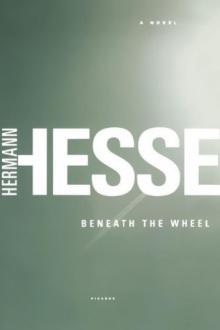 Beneath the Wheel
Beneath the Wheel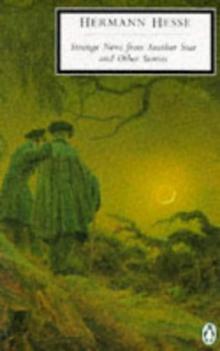 Strange News From Another Star
Strange News From Another Star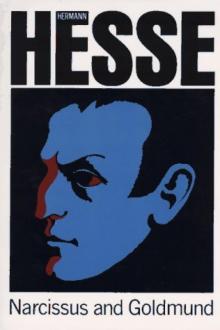 Narcissus and Goldmund
Narcissus and Goldmund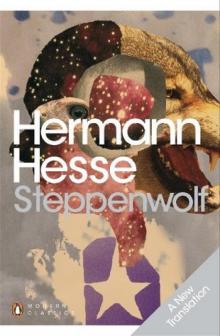 Steppenwolf
Steppenwolf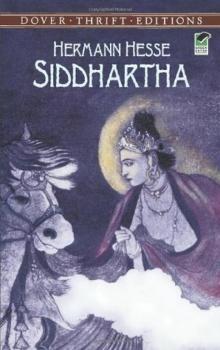 Siddhartha
Siddhartha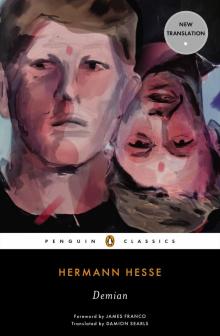 Demian
Demian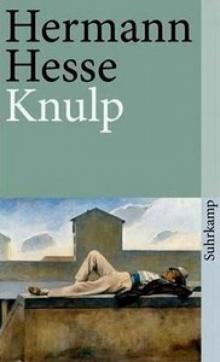 Knulp
Knulp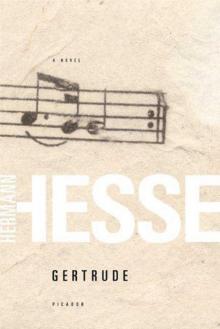 Gertrude
Gertrude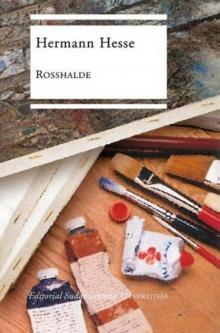 Rosshalde
Rosshalde The Glass Bead Game
The Glass Bead Game The Journey to the East
The Journey to the East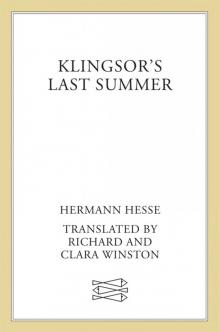 Klingsor's Last Summer
Klingsor's Last Summer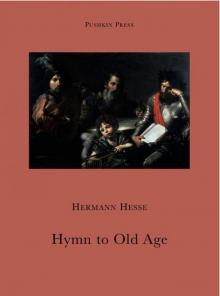 Hymn to Old Age
Hymn to Old Age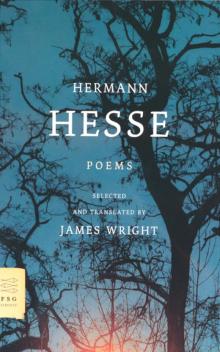 Poems
Poems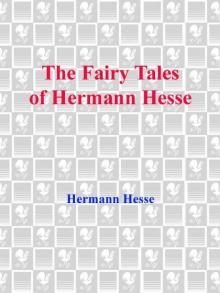 The Fairy Tales of Hermann Hesse
The Fairy Tales of Hermann Hesse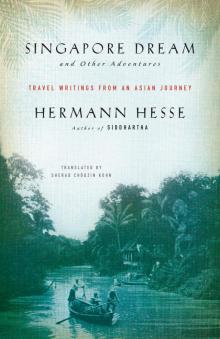 Singapore Dream and Other Adventures
Singapore Dream and Other Adventures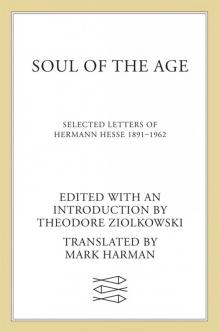 Soul of the Age
Soul of the Age